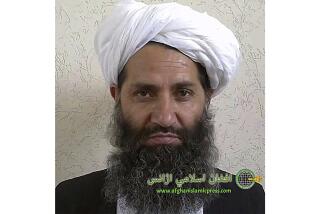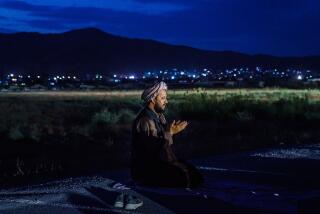Warlord Opposes Tribal Power Sharing
HERAT, Afghanistan — Any new government in Afghanistan should not be divided equally between tribes or religious sects, nor should foreign governments play a role in setting it up, the Northern Alliance general who controls the western city of Herat said Friday.
“The criteria to establishing a government is not tribal or religious, just wise and reasonable people,” Gen. Ismail Khan told reporters in the Foreign Ministry compound, his first news conference since he returned to Herat after the fall of the Taliban here this week.
“It’s not necessary for the United Nations to come” to the capital, Kabul, he said, adding that foreign military forces shouldn’t stay in the country.
“The people of Afghanistan are very sensitive to the presence of foreign troops here,” he said, given the lengthy occupation by the Soviet Union that ended in 1989.
Looking weary after a 36-hour campaign in the western city of Shindand to round up Arab and Pakistani fighters for the Taliban, the white-bearded Khan said he had spent six years thinking about the new government while he was imprisoned by the extremist regime.
“We must put the emphasis on reconstructing Afghanistan again and building a powerful coalition,” he added, something he said he’s confident will happen.
Unlike the post-Soviet, pre-Taliban era, during which various factions that now form the Northern Alliance spent their time squabbling over power, “all of us are now one, working under one title, one name, the Northern Alliance and National Front,” he said.
There also is strong unity among the Afghan people, Khan said. Local rebellions are what finally drove the Taliban out of Herat and other cities, he explained, although he credited U.S. bombing with weakening the enemy’s military strength and morale.
More bombing, especially west of the city, a region that stretches to the Iranian border, would have made the province easier to recapture, he added.
Local Afghans surmised that such bombing didn’t occur because of neighboring Iran’s opposition to the Western campaign as well as warnings that U.S. planes weren’t welcome in Iranian airspace. Many added that they are angry with the Islamic Republic for its stance.
Khan, however, praised Iran for its help in the Afghans’ long struggle, first against the Soviets and later the Taliban.
“Iran is the best example of an Islamic country in the world,” he said. “If someone says they are against Iran, it’s their personal opinion, but in general, we appreciate their policies.”
Khan said his immediate mission is to ensure that Taliban forces are out of his region. He also pledged to renovate schools by spring so that boys and girls can resume their education. Male students, who were the only ones allowed educations under the Taliban, were in the midst of final exams when Herat was liberated, and they haven’t been to school since, officials have said.
“The big poverty in this country is educational poverty,” Khan said, adding that girls especially have been disenfranchised.
Women remained veiled behind the burkas Friday because they want to, not because he has ordered it, Khan added. “This dress is the traditional clothing of Afghanistan, of our religion,” he said. “It’s not an obligation for them to wear it in this city.”
That Khan has won the hearts of the people here is evident. Day and night, throngs of men gather in front of the double metal gate in front of his home. On the gate hangs an oil painting of a younger-looking Khan with his hand extended over a crowd of people.
Yet Khan played down any political role for himself. “I don’t want to rule,” he said. “I just want to make Herat a better [place] for living.”
More to Read
Sign up for Essential California
The most important California stories and recommendations in your inbox every morning.
You may occasionally receive promotional content from the Los Angeles Times.










